Verwenden Sie die Publicize-Funktion von Jetpack auf Ihrer Website?
Kürzlich haben wir beim Durchsuchen von Facebook festgestellt, dass mehrere Leute Links teilen, bei denen WordPress die Website-Domain ersetzt hat. Außerdem lautete der Status wie folgt: Michelle Schulp hat einen Artikel auf WordPress veröffentlicht.
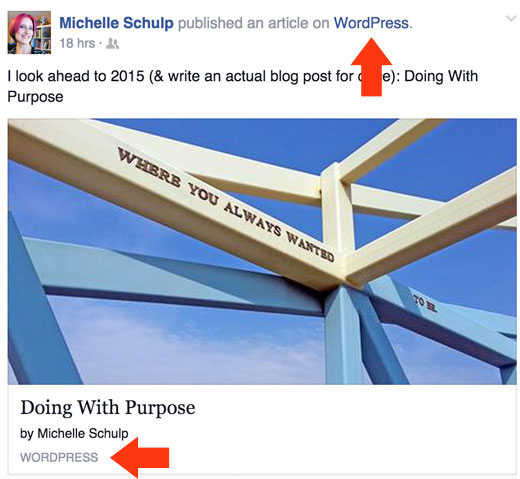
Das war beunruhigend, also beschlossen wir, das Problem zu untersuchen.
Wenn Sie auf den Link klicken, gelangen Sie zur Website. Wenn Sie jedoch auf WordPress klicken, gelangen Sie zu einer WordPress.com-Anmeldeseite auf Facebook.
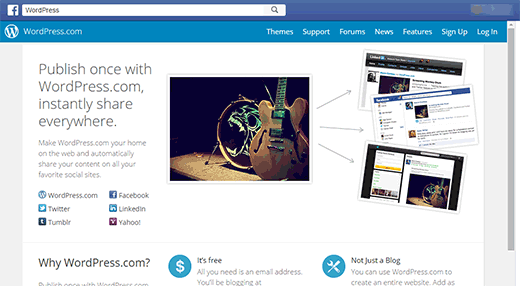
Wir haben weiter untersucht, ob diese Seiten auf WordPress.com, einem Blog-Hosting-Dienst, gehostet wurden. Die meisten davon waren es nicht. (siehe den Unterschied zwischen kostenlosem WordPress.com und selbst gehostetem WordPress.org)
Sie hatten jedoch alle eines gemeinsam. Alle verwendeten das Jetpack-Plugin, das von der Muttergesellschaft von WordPress.com, Automattic, entwickelt wurde.
Um unsere Ergebnisse zu verifizieren, haben wir beschlossen, Jetpack auf einer Testseite zu installieren. Wir haben das Problem reproduziert und es hängt mit der Publicize-Funktion des Plugins zusammen.
Beim Einrichten der Publicize-Funktion werden Sie aufgefordert, sich mit Facebook zu verbinden und mehrere Berechtigungen zu erteilen.
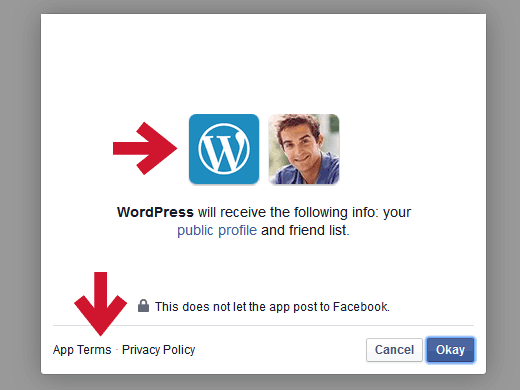
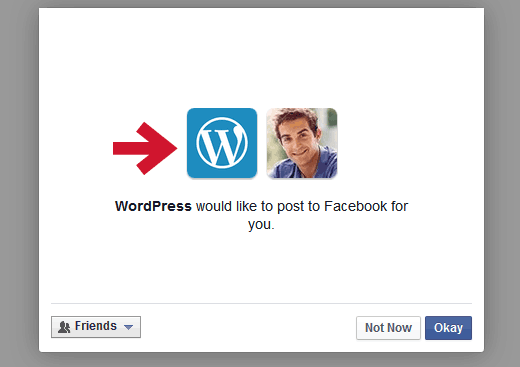
Während des Genehmigungsprozesses sehen Sie das blaue W-Logo anstelle des grauen W-Logos. Wie ist das anders?
Nun, das eine ist für WordPress.com (den Blog-Hosting-Dienst) und das andere ist für WordPress.org (die Software, die wir alle lieben und nutzen).
Verwirrend, nicht wahr.
Anfänger kennen oft den Unterschied nicht, daher denken sie, dass sie tatsächlich ihre WordPress-Site autorisieren, nicht eine Drittanbieter-Plattform von WordPress.com (siehe die Beziehungen und Unterschiede)
Darüber hinaus macht die Formulierung während des gesamten Prozesses nicht deutlich, dass Sie WordPress.com und nicht Ihre tatsächliche Website autorisieren. Siehe den Bestätigungs-Screenshot unten:
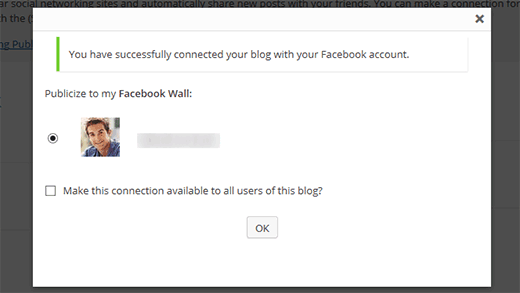
Wenn Sie nun möchten, dass Publicize das tut, was es tun soll (Ihren Beitrag automatisch teilen, wenn er veröffentlicht wird), dann sehen Ihre Benutzer Folgendes.
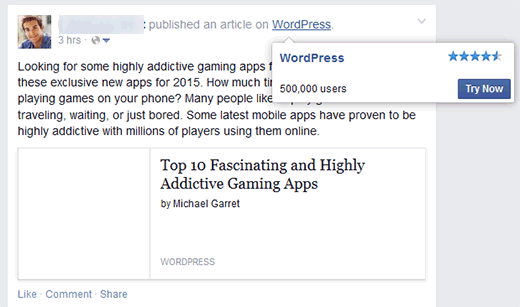
Wir haben weitere Recherchen durchgeführt und festgestellt, dass es sich nicht um ein neues Problem handelt. Es wurde seit 2013 gemeldet mehrere Male.
Da Jetpack auf mehreren großen WordPress-Hosting-Anbietern standardmäßig automatisch installiert und aktiviert wird, sollte dies korrigiert werden, um die Verwirrung zwischen WordPress.com vs. selbst gehostetem WordPress.org zu verringern.
Obwohl wir verstehen, dass Facebook seine Einschränkungen hat, gibt es bestimmte Dinge, die korrigiert werden können und sollten, um die Nutzer besser zu informieren.
Erstens sollte in den Linkdaten unter dem Beitragstitel tatsächlich die Domain des Benutzers angezeigt werden, um seine Marke zu bewerben, anstatt WordPress anzuzeigen. Wie Jeremy vom Jetpack-Team in den Kommentaren unten darauf hingewiesen hat, ist dies aufgrund von Facebook-Beschränkungen nicht möglich.
Zweitens sollte die Formulierung, dass Syed Balkhi einen Artikel auf WordPress veröffentlicht hat, um Verwirrung zu vermeiden, umformuliert werden.
Einer der Benutzer, der das Problem gemeldet hat, machte einen Vorschlag zur Formulierung: Vikas teilte einen Link über Publicize, anstatt zu sagen, Vikas hat einen Artikel auf WordPress veröffentlicht.
Eine weitere Alternative könnte sein: … hat einen Link über JetPack geteilt, denn das ist es, was wirklich passiert.
Schließlich sollte im Bestätigungsdialog stehen: „Sie haben Jetpack erfolgreich mit Facebook verbunden“ oder „Sie haben Ihr Facebook-Konto erfolgreich mit Jetpack verbunden“. [Update: Ticket #1476 erstellt von Jeremy]
Wir hoffen, dass diese Vorschläge dazu beitragen, die Jetpack Publicize-Erfahrung für Benutzer zu verbessern.
Jetpack ist ein großartiges Plugin für Anfänger, die von WordPress.com zu WordPress.org wechseln, da es Ihnen ermöglicht, viele coole Funktionen von WordPress.com beizubehalten und Ihnen gleichzeitig die Leistung und Freiheit von WordPress.org zu geben.
Hinweis: Das Ziel dieses Beitrags ist es nicht, einen Flammenkrieg zu beginnen, sondern die Diskussion anzuregen und unsere Meinung mit der Community zu teilen. Wir haben großen Respekt und Wertschätzung für Automattic und die Arbeit, die sie geleistet haben.
Wenn Ihnen dieser Artikel gefallen hat, abonnieren Sie bitte unseren YouTube-Kanal für WordPress-Videotutorials. Sie finden uns auch auf Twitter und Google+.






Moinuddin Waheed
Ich habe das Jetpack-Plugin schon lange seit den Anfängen benutzt (benutze es jetzt nicht mehr) und wusste nie, dass es die Firma ist, vielleicht ihre Muttergesellschaft Automatic hinter WordPress.com.
Sie haben großartige Arbeit für WordPress geleistet, natürlich für WordPress.org, und riesigen Kunden mit ihren coolen Funktionen geholfen.
Danke, wpbeginner, dass Sie uns gezeigt haben, wie man etwas so nett anspricht, ohne sie zu beleidigen.
inos
Hallo Herr Experten! Ich bin Inos. Ich bin ein echter WP-Anfänger. Jetzt beginne ich mit dem Aufbau meines persönlichen Blogs. Ich habe mich entschieden, ein persönliches Hosting für meinen Blog zu haben. Nach einigen Erfahrungen mit wordpress.com bin ich sehr an einigen inhärenten Funktionen von wordpress.com interessiert, von denen eine die Möglichkeit ist, unsere Blogbeiträge in WP-Lesern anzuzeigen. Ich habe Jetpack erfolgreich installiert, aber ich sehe keine meiner Blogbeiträge im WP-Reader. Wie mache ich das? Danke..
WPBeginner Support
Hallo Inos,
Wenn sich die URL Ihrer Website nach dem Umzug zu einer selbst gehosteten WordPress.org-Website geändert hat, müssen Ihre Benutzer Ihre Website erneut abonnieren. Sie sehen Ihre Beiträge im Reader unter "Gefolgte Websites".
Admin
Jay
Das Wort WordPress ist da, weil die WP FB-App verwendet wird, ich glaube nicht, dass man viel dagegen tun kann. Wenn es durch den Blog-Titel oder den Seitentitel ersetzt werden muss, dann muss es eine Möglichkeit geben, die App-Einstellungen dynamisch zu ändern. Ich bezweifle, dass es derzeit eine solche Möglichkeit gibt.
Sacha
Das ist in der Tat sehr hinterhältig!
Ich benutze Jetpack wegen einiger seiner besseren Funktionen, aber ich mochte Publicize nie.
WP zu Twitter ist besser.
Rozz
Verwenden Sie Jetpack nicht. Verwenden Sie ordnungsgemäß geschriebene Plugins wie Next Scripts. Sie sind zuverlässiger und konfigurierbarer.
Michele Pellegrino
Hallo, dieser Kommentar ist für ROZ. Ich wollte mich nur für die Empfehlung des NextScript-Plugins bedanken, um meinen Blog auf Social-Media-Plattformen zu posten, anstatt JetPack. NextScript war sinnvoll und erlaubte mir, anzugeben, dass der Beitrag an meine Fanpage und NICHT an meine persönliche Seite geht, und war sehr einfach zu konfigurieren. Sehr geschätzt und ein viel besseres Plugin!
Justin
Empfehlen Sie ein anderes Plugin als Jetpack, um WP-Beiträge in sozialen Netzwerken zu veröffentlichen?
Ich benutze Jetpack & habe eigentlich keine großen Probleme mit der WordPress-Promotion, aber mir wurde gesagt, dass „Jetpack insbesondere ein sehr aufgeblähtes Plugin ist, da es viele Funktionen und Mini-Plugins integriert hat. Der Quellcode von Jetpack ist sogar größer als der WordPress-Code. Wenn Sie nicht die Mehrheit seiner Funktionen nutzen, ist es am besten, es zu deaktivieren und zu löschen.“
Ich benutze nur Publicize und die Social-Icons auf jedem Blogbeitrag. Vielen Dank im Voraus!
Asif2BD
Zuerst einmal, @SyedBalkhi, bist du wieder zu Disqus gewechselt!
In letzter Zeit kommt JetPack immer wieder wegen negativer Dinge zurück. Es ist nur ein Feature-reiches Subsystem (ich werde es kein Plugin nennen), aber wahrscheinlich zu viel in einem Paket.
John Nadeau
Forgive me but now I’m confused I have a WordPress.org site self-hosted at http://LeLacAppelle.com. I use (and love) JetPack to publicize my posts to Facebook Page. I don’t see any reference to WordPress.com in my Facebook Page Posts EXCEPT when I’m logged in as an admin/manager to my Facebook Page. Even then it only says “Posted by Wordpress” in gray and a note upon hovering over the question mark “only people that manage this page can see who posted”. Can you look at my Facebook Page at the first two most-recent posts and tell me if you see any reference to WordPress.com ? https://www.facebook.com/TheLakeIsCalling OH WAIT… I’m posting from my WordPress.org Site > JetPack > to a Facebook “PAGE”. Is that the difference? If I were to post to my own “Personal” Facebook Profile/Page, then would I see the behavior you speak of ?
I have a WordPress.org site self-hosted at http://LeLacAppelle.com. I use (and love) JetPack to publicize my posts to Facebook Page. I don’t see any reference to WordPress.com in my Facebook Page Posts EXCEPT when I’m logged in as an admin/manager to my Facebook Page. Even then it only says “Posted by Wordpress” in gray and a note upon hovering over the question mark “only people that manage this page can see who posted”. Can you look at my Facebook Page at the first two most-recent posts and tell me if you see any reference to WordPress.com ? https://www.facebook.com/TheLakeIsCalling OH WAIT… I’m posting from my WordPress.org Site > JetPack > to a Facebook “PAGE”. Is that the difference? If I were to post to my own “Personal” Facebook Profile/Page, then would I see the behavior you speak of ?
Syed Balkhi
Ich sehe auch nicht „veröffentlicht auf WordPress“, daher ist es möglich, dass dies nur für persönliche Profile und nicht für Seiten gilt, es heißt nur „hat einen Link geteilt“.
Jeremy
Ja, Facebook bietet nicht die gleiche Funktionalität für Seiten. Benutzerdefinierte Stories werden nur auf persönlichen Timelines angezeigt.
Cameron Archibald
Ich hoffe, dieses Jetpack vs. Facebook-Problem kann gelöst werden. Aber ich nehme an, der beste Weg, Artikel oder Blogbeiträge zu teilen, ist, dies manuell zu tun. Niemand mag sowieso eine Maschine. Ich habe auch gehört, dass das manuelle vs. automatische Posten von Google genauso entdeckt werden kann wie von Benutzern und der SEO-Saft anders verteilt wird.
Khürt L. Williams
„… manuelles vs. automatisches Posten kann von Google erkannt werden“. Ich hätte gerne etwas, das das untermauert. Ernsthaft, es sei denn, die Automatisierung enthält eine Art von Identifikator, ist dies nicht möglich. Und ich glaube auch nicht, dass es Google interessiert. Warum sollte es das?
takien
Kein Problem für mich.
ebarney
Das ist eine etwas tangentiale Frage, aber ist die Publicize-Funktion nicht „implizites Teilen“ über eine App, laut dem Facebook-Algorithmus?
Für die Seiten, die ich verwalte, haben wir uns nach den Änderungen des Algorithmus im letzten Frühjahr, die die implizite Weitergabe über Apps (http://newsroom.fb.com/news/2014/05/news-feed-fyi-giving-people-more-control-over-when-they-share-from-apps/) herabstufen, dazu entschieden, Publicize über JetPack nicht mehr für Blog-Inhalte zu nutzen.
Das manuelle Kopieren von Artikellinks und die Verwendung des Facebook-Link-Debuggers, um sicherzustellen, dass sie wie gewünscht funktionieren, hat die beste Wirkung, dass Inhalte tatsächlich gesehen werden: https://developers.facebook.com/tools/debug/
Khürt L. Williams
Der Link newsroom.fb.com funktionierte nicht.
Wie sieht Ihre UL aus, die dazu führt, dass sie beim Teilen über Jetpack anders gerendert wird als beim Kopieren und Einfügen?
ebarney
Ich glaube, ich habe meine frühere Antwort geschlossen, ohne sie zu posten, Entschuldigung
Fügen Sie dies nach der Basis-URL newsroom.fb.com ein und sehen Sie, ob das für Sie funktioniert: /news/2014/05/news-feed-fyi-giving-people-more-control-over-when-they-share-from-apps/
Das Teilen über Jetpack wird in den Newsfeeds Ihrer Leser weniger hervorgehoben als das genaue Kopieren und Einfügen derselben URL in das "Teilen"-Feld auf einer Facebook-Seite. Das ist es, was die Änderung des FB-Algorithmus bewirkt, soweit ich das beurteilen kann.
Kein anderer Link, nur eine andere Behandlung des Links, je nachdem, wo/wie er in die FB-Software eingegeben wird.
Apropos FB-Algorithmus und Seiten, es gibt viele andere Bedenken für Seitenbesitzer, wie Inhalte, die Sie teilen, NICHT gesehen werden – nicht Jetpack-bezogen, aber Inhaltsprobleme: http://newsroom.fb.com/news/2014/11/news-feed-fyi-reducing-overly-promotional-page-posts-in-news-feed/
Paul Ames
Toller Fund, danke, ich hasse Facebook sowieso dafür.
Alastair McDermott
Ehrlich gesagt, ich dachte, das sei reine Eigenwerbung der WP.com-Leute. Aber wie üblich gibt es bei solchen Dingen eine andere Option: Sie verwenden eine gängige App, um das Teilen zu erleichtern und die Sache nicht durch die Abfrage von Schlüsseln zu verkomplizieren. (Entschuldigung für die Annahme des Schlimmsten, Jetpack-Leute)
Meine Präferenz ist, dass sie das aktuelle Verhalten in der App dokumentieren, um transparenter zu sein, und eine Option zur Verwendung einer alternativen benutzerdefinierten App anbieten. Aber das fügt einen erheblichen Teil an Funktionalität hinzu, und ich vermute, dass das Jetpack-Team sehr streng ist, was zusätzliche Codezeilen angeht, um potenzielle Bloat zu bekämpfen.
Jeremy
Hallo!
Ich arbeite für Automattic und bin Teil des Jetpack-Teams.
Zunächst einmal vielen Dank für Ihr Feedback!
Das kann in der Tat ein verwirrendes Problem sein. Wie Sie erwähnt haben, hat Facebook seine Einschränkungen, die Dinge kompliziert oder manchmal unmöglich machen, wenn Sie die Ausgabe eines von einer App geposteten Updates anpassen möchten.
To use your own site name or brand there, you’d have to use your own Facebook app. Since Jetpack aims to help you easily push your content to multiple Social Networks, we won’t ask you to create a Facebook developer account, create an app, change the app settings, and copy app ID and secrets somewhere in your WordPress dashboard. That’d be the opposite of “easy”
Das ist nichts, was Sie ändern können, egal ob Sie Jetpack oder eine andere App verwenden, um auf Ihr Facebook-Profil zu posten. Facebook selbst erstellt das Update und den Sharing-Satz basierend auf den App-Einstellungen und den Objekttypen. Mehr dazu erfahren Sie hier:
https://developers.facebook.com/docs/opengraph/creating-custom-stories/
Das wäre in der Tat eine Option. Früher stand dort tatsächlich „WordPress.com“ statt „WordPress“. Wir haben es in „WordPress“ geändert, da Jetpack-Benutzer es verwirrend fanden, dort „WordPress.com“ zu sehen.
Wir haben auch andere Optionen in Betracht gezogen, darunter „Jetpack“. Leider ist dies im Moment aufgrund der Art und Weise, wie unser System aufgebaut ist, nicht möglich, da wir eine einzige App für WordPress.com-Sites und Jetpack-Sites verwenden.
Es steht aber immer noch auf unserer Roadmap! Wir arbeiten derzeit an vielen Verbesserungen für das Publicize-Modul und werden diese Änderungen bald in einem Update veröffentlichen, das wir „Publicize Next“ genannt haben. Hier können Sie einige der Dinge überprüfen, an denen wir arbeiten:
https://github.com/Automattic/jetpack/milestones/Publicize%20Next
Ich bin mir nicht sicher, ob ich Ihren Vorschlag hier verstehe. Meinen Sie, „Ihr Blog“ durch „Jetpack“ zu ersetzen?
Das werden sie! Wir sind immer gerne bereit, Dinge auf der Grundlage von Benutzerfeedback zu überarbeiten und zu verbessern.
Wenn Sie Fehler finden, können Sie uns auch direkt kontaktieren oder ein Problem auf GitHub erstellen!
Syed Balkhi
Danke für die detaillierte Antwort, Jeremy. Ich verstehe die technischen Einschränkungen, warum ein Benutzer das Verb „hat einen Artikel auf WordPress veröffentlicht“ nicht ändern kann.
Mein Punkt ist, dass Sie (Jetpack-Team) als App-Entwickler die Aktion genau darstellen können, und ich freue mich zu sehen, dass Sie bereits daran arbeiten.
This confusion can be solved if Jetpack uses a separate Publicize app for .org sites rather than using the main WP.com app — this keeps the “easiness” entact for users
Was den Bestätigungsdialog betrifft, so steht dort derzeit, dass Ihr Blog jetzt mit Facebook verbunden ist. Dies impliziert eine direkte Verbindung, aber es ist ein Drittanbieter beteiligt (derzeit WordPress.com).
Ich denke, eine klare Bestätigungsnachricht würde lauten: „Sie haben Ihr Facebook-Konto erfolgreich mit Jetpack verbunden“
Das wäre perfekt, wenn/falls es eine eigenständige App für Jetpack gibt.
Nochmals vielen Dank für Ihre Antwort und ich freue mich auf die neue Version.
Jeremy
Ich habe Ihren Vorschlag hier hinzugefügt und wir werden ihn für ein zukünftiges Jetpack-Update berücksichtigen:
https://github.com/Automattic/jetpack/pull/1476
Syed Balkhi
Thanks for your consideration Jeremy
George Stephanis
> This confusion can be solved if Jetpack uses a separate Publicize app for .org sites rather than using the main WP.com app — this keeps the “easiness” entact for users
Aber wenn wir das täten, wie würde das Ihre Behauptung lösen, dass wir die Marken von Benutzern „missbrauchen“, um Jetpack zu bewerben? Es ändert nur das Wort von WordPress zu Jetpack, was für uns noch mehr markenbezogen ist als das generische WordPress.
Syed Balkhi
George, der App-Name auf dem Status zu haben, ist ein natürliches Verhalten auf Facebook, das verstehe ich.
Das Problem, das hier für Verwirrung sorgt, ist der Begriff „WordPress“, von dem es zwei gibt. Die Open-Source-Software und das Hosting-Unternehmen WordPress.com
Auch die Wortwahl beim Aktionsobjekt Ihrer App trägt zur Verwirrung bei:
„veröffentlicht auf“
Wenn die Aktion besagt, dass sie auf WordPress.com veröffentlicht wurde (wäre das nicht eine ungenaue Beschreibung der Aktion, da der Benutzer dies nicht tut?) – Genau wie die Aussage, dass sie auf WordPress veröffentlicht wurde, während die wp.com-App angezeigt wird, ist ebenfalls ungenau.
Das impliziert, dass der Benutzer seinen Artikel auf WordPress.com veröffentlicht, was eine irreführende Aussage ist.
Wenn Sie die Aktion genau beschreiben:
XYZ hat einen Link über Jetpack geteilt, dann täuschen Sie niemanden.
wycks
> That’d be the opposite of “easy”
Übrigens verwende ich eine Nicht-WordPress-App, die dem Benutzer 2 Veröffentlichungsoptionen bietet.
Option 1: Einfaches Veröffentlichen, das die oben genannten Plugin-Einstellungen verwendet.
Option 2: Benutzerdefinierte Domain und App-Einstellungen, dies erfordert etwa 5 Minuten Arbeit und ehrlich gesagt müssen Sie nur die App-Schlüssel kopieren/einfügen, höchstens 2 Felder ausfüllen und auf Speichern klicken.
Sie sollten wirklich in Erwägung ziehen, Ihrem Benutzer beide Optionen anzubieten. Einfach bedeutet nicht, was Sie denken, und es dient auch nicht wirklich allen Benutzern.
Jeremy
Das werden wir bei der Arbeit an „Publicize Next“ auf jeden Fall berücksichtigen, wie ich oben erwähnt habe. Wenn wir diese Option anbieten würden, müssten wir sie wahrscheinlich einfach halten, um das Dashboard nicht mit weiteren Optionen zu überladen. Aber wir können prüfen, ob wir Filter dafür bereitstellen können. Ich habe hier ein Issue erstellt, um diese Idee zu verfolgen: hier.
Keep in mind that all communication with Facebook is done via WordPress.com, though, so it makes things a bit more complicated for us as we’d have to build a new system to allow you to post from your site to your Facebook app without going through WordPress.com and our app. I’m not saying it’s impossible, but at that point, and since there are already plugins that do that well, it might be best to use one of these plugins instead. You don’t have to use each and every Jetpack module, it’s perfectly fine to deactivate a module and use something else when you need something different
„Einfach“ war vielleicht nicht die beste Beschreibung für das, was ich mir dabei gedacht habe.
Die Art und Weise, wie Publicize heute funktioniert, ist sicherlich schneller einzurichten, als wenn man seine eigene App erstellen müsste. Es ist eine schlüsselfertige Lösung, ähnlich wie die meisten anderen Jetpack-Module.
You could get by by copying and pasting things around and following instructions, but you would also become responsible for your own app, and for keeping up with any changes Facebook may make to the system and the interface later on. It works, but it’s not for everyone.
Khürt L. Williams
Ich denke, 'einfach' bedeutet in diesem Zusammenhang eher 'verständlich' – leicht zu verstehen oder 'Ich habe keine Ahnung, was ein Facebook API-Schlüssel ist oder wie ich einen bekomme. Geben Sie mir den einfachen Knopf'.
Option 2 ist nur Fachchinesisch. Was für Sie einfach ist, ist für andere ein Hindernis.
Jeff Yablon
Das ist… beunruhigend, aber nicht überraschend. Es sind auch alte Nachrichten.
Pragmatisch gesehen kann ich WordPress verteidigen, genauso wie ich Facebook verteidigen würde, wenn sie eine E-Mail-Adresse für Sie erfinden, oder Disqus, den Dienst, der diese Kommentare verarbeitet, wenn er Ihren SEO-Saft kapert.
Wenn ich etwas rücksichtsloser spreche, kann ich sagen: „Sie geben Ihnen etwas kostenlos, und obwohl sie die Richtlinien wahrscheinlich in dichten Nutzungsbedingungen offengelegt haben, die weder Sie noch sonst jemand jemals liest, haben sie offengelegt, … äh … richtig? Also reiß dich zusammen.“
Aber ehrlich gesagt, ich fürchte, meine Reaktion geht hauptsächlich auf den Winkel „nicht überraschend“ zurück. Nicht überrascht, dass sie es getan haben, und nicht überrascht, dass Sie nicht innegehalten und überlegt haben, dass es passieren würde.
Im Grunde geht es bei http://thewordpresshelpers.com darum. Und obwohl es nicht darum geht, WordPress/Automattic usw. anzuprangern, geht es uns darum, jeden für alles anzuprangern; Die WordPress-Community ist wohl größer und wichtiger als Facebook oder jede andere Digi-Nation ... und alle ihre Bürger haben die Verantwortung, sich als engagierte, informierte Mitglieder der Community zu verhalten.